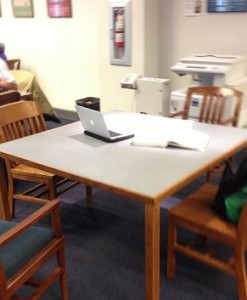According to University Police, 17 laptops have been reported stolen on the Ole Miss campus since August 2012.
It’s important to keep in mind that this number doesn’t reflect stolen smartphones or tablets, only laptops. With technology doubling every 2 years, there are multiple ways to keep yourself, and your mobile devices, protected. The best approach to defending yourself against thieves is to have multiple layers of security. This includes using software to locate your devices in case of theft, encrypting stored personal data, and writing down serial numbers, MAC addresses, and model numbers. The most effective theft deterrent, however, is using common sense.
Don’t leave your devices unprotected, not even for a second. A majority of thefts occur when students step away from their mobile devices during study sessions, prior to class, or in offices while leaving the door unlocked. It’s important to remember never to leave your hardware lying around, as it takes only seconds to pick up an unattended device. Some theft deterrents for laptop thieves include items such as visual stickers, labels, or metal plates indicating the laptop can be traced, cable locks that can anchor the hardware to a chair or table, or even laptop theft alarm systems.
GPS TRACKING SOFTWARE FOR MAC AND PC
For Mac hardware, it’s possible to set up location software, called Find My iPhone, using an iCloud account. This allows you to locate your MacBook, iPhone or iPad, using their built-in GPS capabilities. You can also remotely lock the device, wipe it, have it play a sound, or even display a message on the screen. For PC’s, a program called Prey can help you locate your laptop in the event of theft, and offers many of the same options as the Find My iPhone software.
MAKE YOUR LAPTOP IDENTIFIABLE
There are ways to make sure your laptop is harder to sell in the event of theft, which can be a theft deterrent on its own. One method is “tagging” your laptop, which entails applying a metal security plate with a customized barcode linking to the owner’s information. One of the more common brands of this product is called the Stop Tag, which boasts requiring 800 pounds of pressure to remove, and also has a chemically bonded tattoo underneath that says “Stolen Property.”
PROTECT YOUR PRIVACY
According to a report by Javelin Strategy and Research, in 2012 there were over 12 million cases of identity fraud. It’s important to make sure that your personal information is secure on any of your devices, especially laptops. To keep personal information safe, it’s important to choose strong passwords comprised of a mix of upper and lowercase letters and numbers. It’s also recommended to change your passwords frequently. For added security, you can set up an encryption for sensitive files on your devices, requiring a special password to be able to access them.
ENCRYPTING YOUR PERSONAL INFORMATION
Setting up part of all or your hard drive to be encrypted can help keep your personal information safe in the event of theft, and is relatively easy to do. For Macs running Mountain Lion, you simply use disk utility to create a partitioned section of the hard drive, choose 128 bit or 256 bit encryption (one is more secure, but slower,) and then enter the password you want to use for access to the partitioned drive. (Instructions Here) For PCs, AxCrypt, allows the encryption of single files, and is the self-proclaimed leading open-source encryption program for Windows. (Instructions Here)
* It is important to note that if you encrypt your data, you MUST remember the password used for the encryption. If you forget or lose it, you will be unable to retrieve any of the encrypted data.
REPORT ANY THEFTS IMMEDIATELY
In the event of theft of any personal devices, be sure to notify University Police immediately. The longer you wait to notify the police, the less likely you will be to find stolen devices. UPD can be reached at 662-915-7234, or via email at upd@olemiss.edu.
